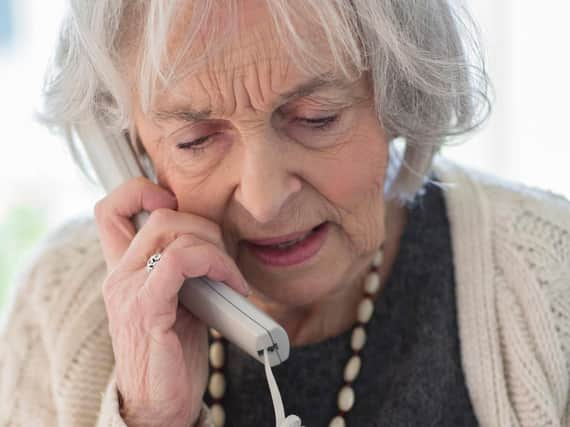Loan fraud, shopping scams and bogus emails - These are the coronavirus cons to look out for


The coronavirus crisis is providing fresh opportunities for fraudsters to strike, particularly as people are now spending more time at home.
Whether it's con artists appearing on the doorstep and posing as good samaritans, or bogus emails and phone calls received while people work at home from laptops, criminals are cynically trying to cash in.
Advertisement
Hide AdAdvertisement
Hide Ad"Scams are among the most prevalent types of crime in the UK, so it is seriously worrying that coronavirus is creating a perfect environment for fraudsters and scammers to thrive using a range of loathsome tactics," says Kate Bevan, Which? Computing editor.


"Help protect yourself by being extra cautious before clicking on any unsolicited emails and texts or answering calls. Make sure your computers, mobile phones and tablets are supported by the latest security updates, and consider installing antivirus software to minimise threats," Bevan adds.
What scams should I watch out for when browsing online?
If you see an item you've been searching for is in stock online, it can be tempting to just snap it up. But before you click the buy button, bear in mind that Action Fraud says many reports are related to online shopping scams, where people have ordered protective face masks, hand sanitiser, and other products, which have never arrived.
Police are also warning people to watch out for loan fraud, where 'fast loans' are offered and the victim pays a fee up-front after being told it is to cover insurance for the loan. But the loan never arrives.
What about emails?
Advertisement
Hide AdAdvertisement
Hide AdCoronavirus-themed phishing emails are a real threat. They attempt to trick people into opening malicious attachments, which could lead to personal details, email logins, passwords and banking details being stolen. They may appear to come from credible health organisations and claim to provide the victim with information on active infections in their area.
Also beware of fake refund emails, whether it's a bogus email claiming to offer a tax refund from HM Revenue and Customs (HMRC), or refund scams claiming to be offering money back for cancelled trips.
Meanwhile, some parents have also reported receiving bogus emails asking them to send their bank details in order to receive free school meals.
The Chartered Trading Standards Institute (CTSI) has also heard reports of fake apps, which claim to provide updates on coronavirus. They may contain ransomware, which upon downloading, locks the phone and displays a message demanding that the user pays up to unlock it.
How could people be tricked on their own doorstep?
Advertisement
Hide AdAdvertisement
Hide AdWhen people are home alone and family and friends aren't around, they may find themselves particularly vulnerable to approaches from strangers calling door-to-door. For example, if you get a knock on the door from someone claiming to be raising money to help others during the coronavirus crisis, beware of charity scams, where fraudsters pose as street fundraisers.
Another cynical trick highlighted by National Trading Standards is criminals pretending they will do someone's shopping for them and disappearing with the cash.
People turning up on the doorstep may also offer fake items, with fake sanitisers, face masks and swabbing kits being sold door-to-door as well as online. And it's not just your cash that's at risk - these products can often be dangerous and unsafe.
How else will criminals look to manipulate people?
Criminals will prey on people's financial worries. With recent stock market volatility, many savers will have concerns about their pensions and investments. So watch out for fake offers of investment and trading opportunities to 'take advantage' of the downturn.
Advertisement
Hide AdAdvertisement
Hide AdBaroness Ros Altmann, a former pensions minister, points out that people being tricked by pension scams typically lose around £80,000. "As more people are forced to stay at home during the current coronavirus crisis and investment markets have plunged, the risks of cold-calling criminals or online fraudsters reaching more savers and luring them into scam investments have grown," she says.
Above all, don't let yourself be rushed or panicked into going ahead with any financial decision, big or small, whether it's due to someone knocking on your door, texting, emailing or calling you.
Allow yourself time to think, and follow tips from Take Five to Stop Fraud.
Editor’s note: first and foremost - and rarely have I written down these words with more sincerity - I hope this finds you well.
Advertisement
Hide AdAdvertisement
Hide AdAlmost certainly you are here because you value the quality and the integrity of the journalism produced by The Yorkshire Post’s journalists - almost all of which live alongside you in Yorkshire, spending the wages they earn with Yorkshire businesses - who last year took this title to the industry watchdog’s Most Trusted Newspaper in Britain accolade.
And that is why I must make an urgent request of you: as advertising revenue declines, your support becomes evermore crucial to the maintenance of the journalistic standards expected of The Yorkshire Post. If you can, safely, please buy a paper or take up a subscription. We want to continue to make you proud of Yorkshire’s National Newspaper but we are going to need your help.
Postal subscription copies can be ordered by calling 0330 4030066 or by emailing [email protected]. Vouchers, to be exchanged at retail sales outlets - our newsagents need you, too - can be subscribed to by contacting subscriptions on 0330 1235950 or by visiting www.localsubsplus.co.uk where you should select The Yorkshire Post from the list of titles available.
If you want to help right now, download our tablet app from the App / Play Stores. Every contribution you make helps to provide this county with the best regional journalism in the country.
Sincerely. Thank you.
James Mitchinson
Editor
